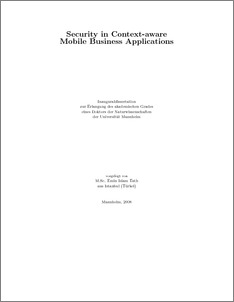|
Security in Context-aware Mobile Business Applications
Tatli, Emin Islam
![[img]](https://madoc.bib.uni-mannheim.de/style/images/fileicons/application_pdf.png)  Vorschau |
|
PDF
dissertation_tatli.pdf
- Veröffentlichte Version
Download (1MB)
|
|
URL:
|
http://ub-madoc.bib.uni-mannheim.de/2270
|
|
URN:
|
urn:nbn:de:bsz:180-madoc-22707
|
|
Dokumenttyp:
|
Dissertation
|
|
Erscheinungsjahr:
|
2008
|
|
Titel einer Zeitschrift oder einer Reihe:
|
None
|
|
Verlag:
|
Universität Mannheim
|
|
Gutachter:
|
Lucks, Stefan
|
|
Datum der mündl. Prüfung:
|
6 März 2009
|
|
Sprache der Veröffentlichung:
|
Englisch
|
|
Einrichtung:
|
Fakultät für Wirtschaftsinformatik und Wirtschaftsmathematik > Theoretische Informatik (Krause 1996-)
|
|
Fachgebiet:
|
004 Informatik
|
|
Fachklassifikation:
|
CCS:
D.2.11 D.4.6 K.4.2 K.4.4 K.6.5 ,
|
|
Normierte Schlagwörter (SWD):
|
Privatsphäre , Kryptologie , Mobile Computing , Computersicherheit
|
|
Freie Schlagwörter (Deutsch):
|
Mobile Business , Google Hacking
|
|
Freie Schlagwörter (Englisch):
|
Security , Privacy , Context-aware applications , Mobile Idenitity Management
|
|
Abstract:
|
The support of location computation on mobile devices (e.g. mobile phones, PDAs) has enabled the development of context-aware and especially location-aware applications (e.g. Restaurant Finder, Friend Finder) which are becoming the new trend for future software applications. However, fears regarding security and privacy are the biggest barriers against their success. Especially, mobile users are afraid of the possible threats against their private identity and personal data. Within the M-Business research group at the University of Mannheim, various security and privacy aspects of context-aware mobile business applications are examined in this thesis. After providing a detailed introduction to context-aware applications, the security challenges of context-aware applications from the perspectives of different principals (i.e. mobile users, the broker, service providers) are analyzed. The privacy aspects, the challenges, the threats and legal directives regarding user privacy are explained and illustrated by real-life examples. The user-centric security architectures integrated within context-aware applications are introduced as anonymity and mobile identity management solutions. The M-Business security architecture providing security components for communication security, dynamic policy-based anonymity, secure storage on mobile devices, identity management for mobile users and cryptography libraries is explained in detail. The LaCoDa compiler which automatically generates final Java code from high level specifications of security protocols is introduced as a software-centric solution for preventing developer-specific security bugs in applications.
|
|
Übersetzter Titel:
|
Sicherheit in kontext-bezogenen Mobile Business Anwendungen
(Deutsch)
|
|
Übersetzung des Abstracts:
|
Die Funktionalitaet der Positionsbestimmung auf mobilen Geraeten (z.B. PDAs, Handys) unterstuetzt die Entwicklung kontext- und besonders ortsbezogener Anwendungen (z.B. Restaurant-Finder, Freund-Finder), die sich als neuer Trend auf dem Softwaremarkt abzeichnen. Eine wesentliche Barriere fuer den kommerziellen Erfolg dieser Anwendungen sind jedoch die Sorgen der Benutzer um ihre Sicherheit und Privatsphaere. Besonders mobile Benutzer fuerchten die Preisgabe ihrer Identitaet und ihrer persoenlichen Daten. Die vorliegende Arbeit ist im Umfeld der Mobile Business Forschungsgruppe an der Universitaet Mannheim entstanden und betrachtet verschiedene Sicherheitsaspekte kontextbezogener Mobile Business Anwendungen. Im Anschluss an eine detaillierte Definition und Beschreibung kontextbezogener Anwendungen werden deren Sicherheitsrisiken aus der Perspektive von mobilen Benutzern, Brokern und Dienstanbietern untersucht. Die verschiedenen Aspekte der Privatsphaere, zugehoerige Risiken und Bedrohungen sowie gesetzliche Vorschriften werden erlaeutert und mit Beispielen aus der Praxis illustriert. Im naechsten Schritt werden benutzerbezogene Sicherheitsarchitekturen vorgestellt, die in kontextbezogene Anwendungen als Loesungen fuer Anonymitaet und mobiles Identitätsmanagement integriert werden koennen. Darauf aufbauend wird eine Mobile Business Sicherheitsarchitektur beschrieben, die verschiedene Sicherheitskomponenten fuer Kommunikationssicherheit, dynamische policybasierte Anonymitaet, sichere Datenhaltung auf mobilen Geraeten, mobiles Identitaetsmanagement und kryptographische Bibliotheken bereitstellt. Schliesslich wird der kryptographische Compiler LaCoDa diskutiert, der Spezifikationen kryptographischer Protokolle automatisch in Java-Code uebersetzt und damit das Risiko implementationsbedingter Sicherheitsluecken verringert.
(Deutsch)
|
|
Zusätzliche Informationen:
|
|
 | Das Dokument wird vom Publikationsserver der Universitätsbibliothek Mannheim bereitgestellt. |
 Suche Autoren in Suche Autoren in
Sie haben einen Fehler gefunden? Teilen Sie uns Ihren Korrekturwunsch bitte hier mit: E-Mail
Actions (login required)
 |
Eintrag anzeigen |
|
|
